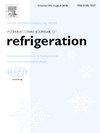Cooling degree hour-based optimization of air-side free and partial free cooling strategies for mediterranean buildings: A case study
IF 3.5
2区 工程技术
Q1 ENGINEERING, MECHANICAL
International Journal of Refrigeration-revue Internationale Du Froid
Pub Date : 2025-06-30
DOI:10.1016/j.ijrefrig.2025.06.033
引用次数: 0
Abstract
This study presents an advanced assessment of air-based free and partial free cooling strategies to optimize energy efficiency in Mediterranean buildings, specifically in Muğla, Turkey. Utilizing cooling degree hours, free cooling degree hours, and partial free cooling degree hours, the study extends conventional models by incorporating varied comfort thresholds and outdoor climatic variations. The results reveal that a higher free cooling threshold (28 °C) maximizes energy savings, reaching up to 18 % during transitional seasons, whereas a lower threshold (22 °C) leads to increased reliance on mechanical cooling. The findings emphasize that free cooling is most effective during nighttime and transitional months, while mechanical cooling remains necessary during peak summer, with cooling degree hours peaking at 461 °C·h. An optimal partial free cooling range of 23 °C to 24 °C is identified for further efficiency improvements. This research fills a knowledge gap by offering a rigorous methodology tailored to Mediterranean climates and provides actionable insights for sustainable cooling strategies. Future studies could integrate real-time weather data and humidity effects to refine predictive models for enhanced energy efficiency.
地中海建筑空气侧自由和部分自由冷却策略的降温度小时优化:一个案例研究
本研究提出了空气自由和部分自由冷却策略的先进评估,以优化地中海建筑的能源效率,特别是在Muğla,土耳其。利用冷却度小时、自由冷却度小时和部分自由冷却度小时,该研究通过纳入不同的舒适阈值和室外气候变化来扩展传统模型。结果表明,较高的自然冷却阈值(28°C)可最大限度地节省能源,在过渡季节可达到18%,而较低的阈值(22°C)会增加对机械冷却的依赖。研究结果强调,自然冷却在夜间和过渡月份最有效,而机械冷却在夏季高峰时期仍然是必要的,冷却度小时达到461°C·h。确定了23°C至24°C的最佳部分自由冷却范围,以进一步提高效率。这项研究填补了知识空白,提供了一个严格的方法量身定制的地中海气候,并为可持续冷却策略提供了可行的见解。未来的研究可以整合实时天气数据和湿度影响,以改进预测模型,提高能源效率。
本文章由计算机程序翻译,如有差异,请以英文原文为准。
求助全文
约1分钟内获得全文
求助全文
来源期刊
CiteScore
7.30
自引率
12.80%
发文量
363
审稿时长
3.7 months
期刊介绍:
The International Journal of Refrigeration is published for the International Institute of Refrigeration (IIR) by Elsevier. It is essential reading for all those wishing to keep abreast of research and industrial news in refrigeration, air conditioning and associated fields. This is particularly important in these times of rapid introduction of alternative refrigerants and the emergence of new technology. The journal has published special issues on alternative refrigerants and novel topics in the field of boiling, condensation, heat pumps, food refrigeration, carbon dioxide, ammonia, hydrocarbons, magnetic refrigeration at room temperature, sorptive cooling, phase change materials and slurries, ejector technology, compressors, and solar cooling.
As well as original research papers the International Journal of Refrigeration also includes review articles, papers presented at IIR conferences, short reports and letters describing preliminary results and experimental details, and letters to the Editor on recent areas of discussion and controversy. Other features include forthcoming events, conference reports and book reviews.
Papers are published in either English or French with the IIR news section in both languages.

 求助内容:
求助内容: 应助结果提醒方式:
应助结果提醒方式:


